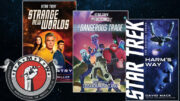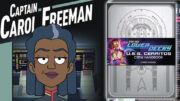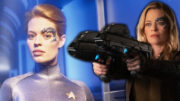When I was a kid growing up in Connecticut in the 1980s, the town library was right across the playground from our school. At recess, we were allowed to go to the library to check out books. My favorites were the 1950s pulp science fiction novels—pedal-to-the-metal adventure tales by folks like Edgar Rice Burroughs, Philip Francis Nowlan, and Robert E. Howard. They were novels that you could read quickly, took you to fantastic places, and didn’t pause for things like an inner life for the characters, questions of morality, or indeed setbacks of any kind.
Planet 6, the debut novel of Hugo-winning Star Trek writer Morgan Gendel, reads very much like a nostalgic 1950’s pulp-style science fiction story, and this is both its greatest strength and its greatest weakness. If you grew up thrilling to those Amazing Stories or Weird Tales and you look on them with fondness, you will almost certainly enjoy Planet 6. But don’t look here for psychological depth, character relatability, or any sort of introspection.
From this point on, this review may contain SPOILERS! Proceed at your own risk!
Morgan Gendel is an experienced and talented writer who has focused most of his extensive career on television writing. Best known to Trek fans as the writer of the fan-favorite and Hugo award-winning Star Trek: The Next Generation episode, “The Inner Light,” as well as the Die Hard-on-a-starship entry, “Starship Mine,” DS9’s “The Passenger,” and “Armageddon Game,” Gendel also worked on Law & Order as a writer, co-executive producer, and executive story editor, and he helped develop Spider-Man: The New Animated Series in the early 2000s. He has a list of credits two arms long, including The 100, Drop Dead Diva, V.I.P., Nash Bridges, and so much more. Gendel clearly knows both action-adventure and intimate drama. Planet 6 is his first novel, and it falls squarely in the action-adventure category, far more “Starship Mine” than “The Inner Light,” but resembling A Princess of Mars more than any of his Trek episodes.
That 1950’s pulp action science fiction feel is both the novel’s greatest strength and its biggest weakness. The science is clearly far more up-to-date than those pulp tales of yesteryear. Set about 350 years in the future, where our hero Zed Hellfinger is a 19-year-old cadet in the SkyRider corps, not yet graduated from the academy. But due to a catastrophic mission, he has been entrusted with his unit commander’s Disc, a 1.5-meter diameter, plasma-powered flying disc that responds to its rider’s personal movements like a super-smart Segway of the skies. Armed with Rifle, wearing Helmet, and flying Disc (no articles needed, these are names, not descriptions), Hellfinger zooms from danger to danger and adventure to adventure, trying to stop the army of the ironically-named Indigenous People’s Assembly from wiping out the SkyRider corps entirely, and taking over one of the most strategic planets in the galaxy. Along the way, he collects a small group of supporting characters around him, including a giantess ‘Zon (shortened from Amazon), an experienced military man, and an expert botanist. And Zed needs to keep a sharp lookout for a traitor in the SkyRider corps. The team’s adventures eventually bring them across the path of an assassin and master of disguise who turns out to be the novel’s antagonist.
The story isn’t overburdened with psychological insight, characters wrestling with their innermost selves, or anything else that would slow it down. It moves at a fast clip, and uses its characters merely as means to tell an adventure story. But like a pulpy 1950s sci-fi story, the hero has no weaknesses, makes no mistakes, and doesn’t learn much of anything along the way. He is described as brash and impulsive while never doing much that is brash or impulsive. The hero and the villain only cross paths at the very end, and it is due to the villain’s actions, not the hero’s. Of the four female characters in the book, two are just walk-ons, and one is introduced in the middle of the story for the sole purpose of having sex with the hero, and is then almost immediately killed. Only the fourth female emerges as anything like a real character.
Gendel writes in the introduction that the bones of this story came from his old Russian physics professor from college, who left Gendel his story notes in his will. And Planet 6 reads like that—a story concocted by an old Russian emigre back in the 1960s, hearkening to the science fiction that he grew up on. Everything from the campy character names to the simple politics bears that echo.
Fans of pulp science fiction will enjoy Planet 6 as a rip-roaring adventure novel that takes you from A to B to C at a breakneck pace without many twists. The science is fun, the settings are exotic, and nothing in the book will tax the reader significantly. And if it lacks depth, hey, that’s what most pulp stories were like, too. They exist in order to provide escapist fantasy for someone looking to burn away an afternoon or two. If that’s what you want, Planet 6 fits the bill.
Read our interview with Morgan Gendel about writing “The Inner Light.”
Planet 6 is out now
DISCLAIMER: We may link to products to buy on Amazon in our articles, these links are customized affiliate links that support TrekMovie by earning a small commission when you purchase through the links.







I find it odd that the article’s writer didn’t mention “The Outer Light,” Gendel’s sequel to “The Inner Light”–especially because its first few chapters debuted as exclusive to this very site!
Pretty sure The Outer Light didn’t quite rise to the level of it’s predecessor.
I think people give a little too much importance to character analysis or psychological depth in stories these days. Sometimes it is good to just turn off your brain, sit back and enjoy the brainless fun. The moment we started giving importance to everything and made everything needlessly complex I think we lost the fun of the simplicity of old times and this has been one of the reason why everything seems so dour these days. We just forgot to have fun anymore and this applies to our stories and entertainment too.
The thing is that the kind of simplicity you’re talking about alphantrion seems to be a 1950s post-WWII thing.
Sometimes I think that a lot of the hyperviolent comic universe product available currently is an attempt to get back at that simplicity while satisfying the attention-stimulating needs of current readers and viewers.
By contrast, complexity and an allegorical eye to the times has been a characteristic of Trek and a lot of good sci-fi since the 60s.
And looking back, I can see that allegory from ‘Rudolph the Red Nose Reindeer’ (rightly celebrated by The Orville), through ‘Let that be your Last Battlefield’ in TOS, and a generation of post-Armageddon fiction such as ‘A Canticle for Leibowitz’, had a profound impact on my values.
That said, I can see your point that too many dimensions of allegorical and psychological complexity in a single piece of fiction – be it text or video – loses the points that are trying to be conveyed.
I can also agree that sometimes it’s just nice to go along for the ride and enjoy some pure entertainment.
alphantrion totally gets what I was trying to do. Publishers have been complaining for decades that they are losing youngish readers — particularly men 18-45. IMHO it’s because a lot of sci-fi (to focus on my fave genre) has become over-intellectualized. And BTW, that does NOT mean P6’s characters are not introspective or relatable. PLANET 6 has roughly the same levels of that as, say, a STAR WARS movie. My hero, Zed Hellfinger, several times ponders his own inadequacies — and in fact, his Commandant uses Zed’s stubborness as a key element leading up to the climax (which definitely involves a twist, one of many in the book). Those things, I suspect, are easy to miss due to the relentless pace of the story — intentional on my part to appeal to today’s video-game-playing, Marvel-movie-going audience. Up to you readers to tell me if I’ve succeeded.
Morgan, thanks for dropping by, I always loved your work on Trek, especially The Inner Light. Continue the good work :))
“The hero has no weaknesses, makes no mistakes, and doesn’t learn much of anything along the way.”
Why, how very Michael Burnhamesque of him! :D